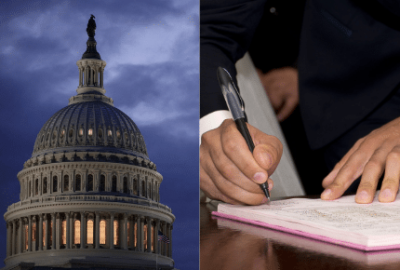To listen to the Federal Newscast on your phone or mobile device, subscribe in PodcastOne or Apple Podcasts. The best listening experience on desktop can be found using Chrome, Firefox or Safari.
- Two House Democrats are introducing their own legislation that would give federal retirees a higher cost-of-living adjustment next year. Rep. Peter DeFazio (D-Ore.) and Ways and Means Subcommittee Chairman John Larson (D-Conn.) said next year’s COLA should be 3%. The Social Security Administration announced a 1.3% cost-of-living adjustment for retirees last week — the lowest COLA in four years. Lawmakers said it doesn’t keep pace with the pressures retirees feel today during the pandemic.
- The Defense Department and Department of Health and Human Services are teaming up with industry to provide COVID-19 vaccines to long-term care facilities once they are available. The agencies are partnering with CVS and Walgreens to give out the free vaccines. Skilled nursing facilities, nursing homes, assisted living facilities, residential care homes and adult family homes will all be eligible for the program. The companies will schedule on-site clinic dates with each facility.
- A new Pentagon study suggests it’s very, very hard to contract coronavirus aboard a commercial aircraft. Researchers for the Defense Advanced Research Projects Agency and U.S. Transportation Command simulated how droplets move through the air aboard 767 and 777 jetliners, and estimated it would take 54 hours of flight time for one person to infect someone else. That’s mostly because commercial airplanes bring in more fresh air than pretty much any indoor environment on the planet. The authors said it takes about six minutes to remove a single viral droplet from inside an airplane — faster than most hospitals and biosafety labs.
- The Small Business Administration’s inspector general warns thousands of Paycheck Protection Program loans may have gone to ineligible borrowers during the coronavirus pandemic. The inspector general’s office reported SBA approved loans for businesses that were on the Treasury Department’s Do Not Pay database, as well as loans for amounts higher than what businesses should have received, based on how many employees they had. The IG expects to release a final report on how SBA disbursed funding for PPP loans early next year. The Justice Department so far has charged 56 people defrauding the program out of tens of millions of dollars. (Federal News Network)
- A new report finds the Equal Employment Opportunity Commission could do a better job keeping track of workplace retaliation that stems from sexual harassment complaints. The Government Accountability Office said while the EEOC collects data on sexual harassment claims, it can’t fully analyze the problem, since it doesn’t separate data on claims that employers retaliated against workers who reported sexual harassment from claims that employers retaliated for other reasons.
- A group of Senate Democrats are calling on the U.S. Agency for International Development to continue diversity and inclusion programs despite a recent executive order from the president. The Trump administration is effectively banning all agency diversity and inclusion training pending review and approval from the Office of Personnel Management. But the senators are asking the USAID administrator to continue them anyway. They say any decisions to pause USAID diversity and inclusion training will contradict recent recommendations from the Government Accountability Office. GAO suggested USAID leadership pay more attention to improving diversity within the agency’s top ranks. (Sen. Ben Cardin)
- One of the longest serving agency chief information officers is leaving. Rajive Mathur, the Social Security Administration deputy commissioner and CIO, is leaving after more than three years in the role. Federal News Network has confirmed Mathur’s last day as CIO will be Oct. 26. SSA Commissioner Andrew Saul said in an email to staff, which Federal News Network obtained, that until his departure at the end of the year, Mathur will work in the commissioner’s office as a senior advisor. Saul also said Sean Brune, currently the assistant deputy commissioner and deputy CIO, will be the new deputy commissioner and CIO. (Federal News Network)
- The General Services Administration officially added another piece to the acquisition system modernization puzzle. Over the weekend, GSA finalized the migration of the contract data reporting tool to Beta.SAM.gov from FPDS.gov. The agency has been running both sites in parallel to ensure the transition to the new Beta.SAM.gov goes smoothly. The new site offers more capabilities like being able to run reports based on 12 years of data and reports can return 150,000 rows instead of 30,000. The FPDS reporting capabilities will be the fifth system migrated into the new environment.
- Agencies are exploring how technology could improve their handling of Freedom of Information Act requests. The Justice Department’s Office of Information Policy will host an “Artificial Intelligence 101” session next month for agency FOIA professionals. Meanwhile, the Chief FOIA Officer Council’s technology committee has launched eight working groups focused on bringing the IT infrastructure that supports FOIA requests into the digital era. Committee officials say some agencies have had trouble processing FOIA requests during the COVID-19 pandemic, because employees can’t remotely access some of the software they need. (Federal News Network)
- As the country begins adapting more and more 5G technology, the Department of Homeland Security is establishing research and development efforts focused on mobile security. DHS said 5G technology will create some vulnerabilities to critical areas like supply chains and network security. Its Science and Technology Directorate will soon be launching “Secure and Resilient Mobile Network Infrastructure” R&D projects to help with securing those areas.
- Democratic senators want DHS to rethink its plans to expand the use of biometric surveillance. A recent proposal from DHS would allow U.S. Citizenship and Immigration Services to create detailed biological profiles of individuals involved in the immigration system by amassing data from facial scans, voice prints, and even DNA testing. The senators worry the move would “chill” legal immigration and go against U.S. privacy values. (Sen. Ed Markey)
- EPA Administrator Andrew Wheeler received an award from an unusual source. Wheeler apparently has a soft spot for critters. A year ago, he signed a directive to start reducing animal testing at the EPA, and five university grants to develop alternate methods to reduce or replace testing on vertebrae. The plan is to eliminate it by 2035. Now Wheeler’s been recognized by a group called the White Coat Waste Project, which opposes animal testing. It gave Wheeler what it calls the Greenbaum Policy Pioneer Award — its first ever.
- The Army said it’s doing better on improving privatized military housing, however, there are still glaring issues. In the nearly two years since the military received mass reports about lead paint, mice and mold in privatized housing, the services have made some improvements. The Army has invested $500 million in housing and plans to invest $2.8 billion more in the next five years. The service is also remodeling 18,000 homes and building 3,800 new ones. However, the military still has not implemented at least three of the 18 provisions in the tenant bill of rights. The missing privileges are some of the most impactful and include a remediation process for disputes with landlords.
- President Donald Trump signed the National Suicide Hotline Designation Act into law. It designates 988 as the new universal telephone number for the national suicide prevention and mental health crisis hotline system. Supporters say it will make it easier for those suffering from mental health crises to reach help. The Federal Communications Commission designated 988 as the national number earlier this year. The implementation will take a couple of years so for now, the current number still remains 1-800-273-8255.
Copyright
© 2024 Federal News Network. All rights reserved. This website is not intended for users located within the European Economic Area.




